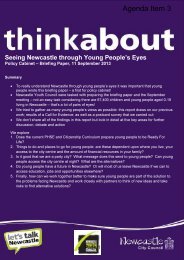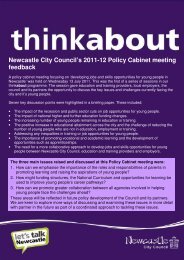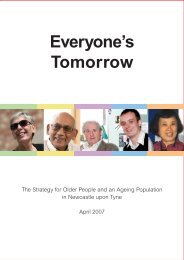NEWCASTLE'S MUSICAL HERITAGE AN INTRODUCTION By ...
NEWCASTLE'S MUSICAL HERITAGE AN INTRODUCTION By ...
NEWCASTLE'S MUSICAL HERITAGE AN INTRODUCTION By ...
You also want an ePaper? Increase the reach of your titles
YUMPU automatically turns print PDFs into web optimized ePapers that Google loves.
Orchestra’s activities but it was indeed active in 1920 when the following press<br />
notice appeared in the Journal:<br />
‘Now that we have got the Town Hall back to concert pitch, the Newcastle<br />
Symphony Orchestra has no longer to suffer the indignity of going to Gateshead<br />
to give its periodical concerts. Yesterday there was quite a good audience for<br />
the matinee, and the programme met with generous and just appreciation.<br />
Chiefly composed of amateurs, most of whom are ladies, the Symphony<br />
Orchesta has reached a very creditable degree of proficiency and their playing<br />
yesterday was marked by cultured musicianship and refinement of phrasing.<br />
Their big number came last in the programme, Schubert’s Seventh Symphony,<br />
and if proved a wholly enjoyable experience to renew acquaintance with this<br />
melodious masterpiece. A commendable balance of tone was preserved<br />
throughout and the second allegro and the fascinating scherzo were particularly<br />
well done. The whole work is full of genuine melodic interest and despite its great<br />
length, it was well enough played to sustain interest right to the end. The<br />
symphony may be regarded as a fine collection of inspired tunes and Mr<br />
Hamilton Harty and his forces deserve high praise for so musicianly a<br />
performance.’<br />
The review continues in similar vein praising the orchestra’s playing of<br />
Smetana and Wagner, but it is the mention of Hamilton Harty in the earlier part of<br />
the piece that lends special interest to this orchestra’s activities and sets it apart<br />
from its rival, the Philharmonic. In the Tyne and Wear Archives I found one of the<br />
Societies Minute Books covering the period 1932 –38, which gave an insight into<br />
the orchestra’s activities over the period.<br />
1932 : 7 th Sept Meeting expressed concern at the resignations from the<br />
Society ‘In view of the prevailing depression in the district.’ Regarding booking<br />
the City Hall for the forthcoming concert the minutes reflect on ‘the difficulty of<br />
adequately filling the hall and what steps could be taken to increase public<br />
attendance’.<br />
Leading shops and firms could be asked to interest themselves and their<br />
employees in the Society’s events.<br />
Blocks of tickets could be issued at reduced prices. The Secretary was asked to<br />
consult with Dr Sargent on the matter as it was felt that he would have had<br />
valuable experience in that direction.<br />
1933: 10 th April. Dr Sargent arranged a Haydn, Beethoven programme<br />
bearing in mind it did not call for additional wind instruments, which adds to the<br />
cost. In these difficult times costs should be kept as low as possible.<br />
1934: 24 th May. The question of Entertainment tax came up and it was<br />
decided to make the next concert an Invitation Concert to which the general<br />
public would not be admitted.<br />
88

















